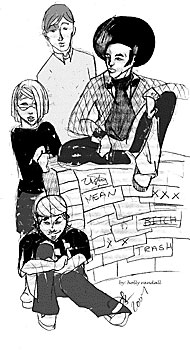
Illustration by Holly Randall
|
|
Arizona Daily Wildcat
Wednesday, September 22, 2004
Print this
UA Discusses Diversity will take place today at the Student Union Memorial Center. It is a daylong event that will feature speakers, workshops and discussions focusing on the topic of increasing diversity on campus. In light of this event, we asked our columnists: Are efforts by the UA in promoting diversity and tolerance being taken too far, or not far enough?
Leave tact behind, but promote tolerance
Political correctness and diversity are trivial adjectives that an organization throws around to improve its image. These two terms have been promoted superfluously and have now become weak words without influential meanings. The UA, along with many other schools and businesses, has taken the elements of diversity and political correctness too far.
The purpose behind being politically correct is to prevent offending people. However, readjusting one's language to the extent of making it "politically correct" sometimes skews the intended meaning an individual is trying to get across. Sometimes in order to get a specific point across, it must be politically incorrect.
Take Arnold Schwarzenegger and his "girly men" comment toward the California State Legislature. Not politically correct, but it had to be said in order to pack the punch he wanted.
Now to diversity. It is a good element to have; however, once again it has been pushed too far by the UA. Too often have been stats thrown around, promoting the numbers of Mexicans or African-Americans or Asians. These numbers are not important. Every person has their own individuality, which makes them diverse in their own way. I guarantee a person can go virtually anywhere and find some sort of diversity.
Diversity should be promoted, but not beaten to death. Diversity is not the ultimate factor in an individual's choice to attend college and it doesn't needed to be promoted at every turn.
As for tolerance, tolerance can never be promoted too far. Tolerance is something an organized society needs to function smoothly and efficiently. Tolerance builds a strong foundation and leads to unity. Tolerance encourages respect for the sexual preferences of others, religious choices and other lifestyles, without actually agreeing with what they stand for. The main concern is respect. Tolerance is respect without actual agreement and the fact that we can practice this makes us a great society.
Moe Naqvi is a physiological sciences freshman. He can be reached at letters@wildcat.arizona.edu.
UA should embrace, not ignore, differences
Lately, censorship comes to mind when I ponder the diversity that exists here on campus, and how everyone's difference has to be approached in a special, textbook sort of way so that no one is ever offended.
Doesn't diversity imply incongruity and variety?
Take, for example, the long-standing debate over whether tortillas should be thrown at graduation because it is offensive to the Mexican and American Indian population. Now, don't get me wrong, but doesn't that imply that we have diversity here at the UA?
If we are celebrating the inherent diversity at the UA, mainly because of its location, with a symbolic food, why would it be offensive?
I hate to admit this because I'm an advocate of change, but sometimes tradition trumps social issues like racism. Honestly, I find it even more offensive, if we ignore a recent tradition that directly correlates to the rich culture that existed here centuries before the UA. Seriously, what does that say about the hopes to become a Hispanic-serving institution?
Strictly on the lines of acknowledgement, the UA should embrace the contrasting cultures rooted in our university and learn from it, rather than pretending that lines of distinction don't matter.
Lauren Peckler is a sophomore majoring in sociology and English. She can be reached at letters@wildcat.arizona.edu.
When both sides complain, university in right spot
"Where's your diversity plan?"
This question faces university administrators everyday, and ignoring it is simply not an option.
"How are you making sure that you're not focusing on diversity so much that you forget everyone else?"
This question also faces university administrators everyday, and ignoring it is also not an option.
Simply put, being an administrator is more of a juggling act than anything else, especially with regards to issues like diversity. There are going to be so many different (well-founded) views on the proper role of diversity that picking only one is impossible.
Instead, ideology steps aside to make way for practicality. The university picks a policy in the middle of the road. Or rather, as so often is the case, the university uses vague descriptions that more or less skirt around the question.
But perhaps there is a more deeply rooted reason for this.
Step back and examine the position the university it is in. Choosing a diversity policy puts administrators in the awkward position of both setting and reflecting societal standards. The challenge is thus to be both progressive and retrospective at the same time.
No easy task.
So let the left complain and let the right complain. And there the university will be, right in between.
Ryan Johnson is an international studies and economics junior. He can be reached at letters@wildcat.arizona.edu.
Steps toward diversity taking the wrong course
It is not so much that the University of Arizona's administrators and students take diversity and tolerance too far. It is simply a matter of them applying their desire for tolerance in all the wrong ways.
For instance, the Writing on the Wall Project put together by RHA is definitely an interesting idea that showcases some of the hateful things heard by students. But really, it accomplishes nothing except to generate emotions.
Emotions might result in enough trepidation toward the display of hate that students will act upon their anger, but in all likelihood, these feelings will pass quickly. After all, feelings come and feelings go. Many students might show up to tear down that wall, but how many of them will stop saying "gay" in derogatory fashions?
The administration as well as students are heading the wrong direction in their effort to increase tolerance. The administration has done everything it can to increase Hispanic enrollment, going so far as to rename the Cesar Chavez building. Supposedly, the name-change would help encourage Hispanic students to enroll. But really, a building's name has that much power? Maybe it's time to give my jalopy the name Speed Demon.
While the efforts on campus mean well, most of them do not produce a change in the average student. And without a change, these actions mean nothing.
Laura Keslar is a pre-pharmacy junior. She can be reached at letters@wildcat.arizona.edu.
 |
|
Susan Bonicillo
Opinions editor
|
|
|
Diversity efforts valuable to education at UA
I used to think diversity was just some hippie invention, a touchy-feely word used only by overly sensitive people. I believed the concept of diversity did a huge disservice to the individual, by placing too much emphasis on culture to the point where the individual's unique personality became lost amidst a sea of political correctness and tact.
I no longer think this.
Feel free to accuse me of the cardinal sin of the flip-flop, but in light of seeing for myself how much my background and culture has made me into the person I am today, it would be foolish to ignore the impact one's background has.
Since the proposal of making the UA a Hispanic-serving institution has come up this year, the issue of diversity has reared it head.
Many disagree with the idea, arguing that the underqualified will be allowing admission solely because of their race and sparking up the debate of reverse discrimination.
Though this is a valid concern, this belief carries with it the underlying assumption that students of different races will be let into the UA regardless of their academic standards.
How can students of color ever feel welcome at the UA if their own fellow students believe they are there because a quota must be met?
This type of thinking contributes to animosity in terms of who deserves to be here and greatly hinders us from achieving the sort of harmony the UA is trying to reach.
College should serve as a place in which we experience a multitude of different experiences. This cannot be realized, however, if the UA does not seek people of different backgrounds in order escape the confines of homogeny.
In order for diversity to be reached, the UA community must not only seek to integrate people of differing backgrounds, but can and should extend to differing religions, sexualities, and economic classes. At the same time, the UA must also understand why diversity is important: Diversity seeks to liberate us from narrow views of the world by integrating perspectives we would otherwise not hear.
Susan Bonicillo is a junior majoring in English. She can be reached at letters@wildcat.arizona.edu.
RHA project takes tolerance, diversity too far for nothing
The so-called Writing on the Wall Project is an indication that things have gone way too far here at the University of Arizona. It's not that intolerance and discrimination have gone too far, but rather that thoughts of political correctness and diversity are clouding the minds of people and making them do ridiculous things.
People should realize intolerance exists in the world, and if they are living in some sort of personal bubble so they are ignorant of that fact, it does not really serve a positive purpose to make them aware of it. If they are so far-removed from reality to begin with, they're probably not out walking around and yelling epithets at members of another ethnic group.
Even worse than the wall itself is the ceremony that is taking place this morning where it will be torn down, as the Wildcat put it, "as a symbol of the collaboration needed to erase divisions between people." Yeah, I am sure that it's going to really affect the wider campus community to see a bunch of people destroying this project in a useless attempt to feel like they are reversing decades of ethnic tension.
At the end of the project's run, the biggest impact is really going to be made on the intolerant members of the campus community - it will have given them a bunch of new terms they didn't know that they can offend others with.
Aaron Okin is a regional development and political science senior. He can be reached at letters@wildcat.arizona.edu.
